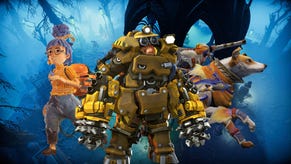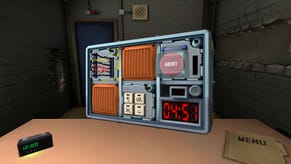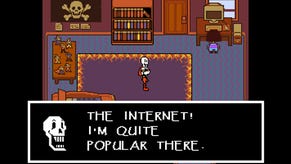The RPS Advent Calendar – Dec 4th: Keep Talking And Nobody Explodes
The best coop game of 2015.
What is the best co-op game of 2015? The RPS Advent Calendar highlights our favourite games from throughout the year, and behind today's door is...
Keep Talking And Nobody Explodes!
Graham: Bomb Squad, assemble!
Adam: I’ll assemble. But we’ll probably end up disassembled as soon as Morse Code enters the picture.
Pip: That Morse Code disaster will haunt me forever. Do we know anyone who knows Morse Code and can join our group?
Adam: Morse Code seems like the kind of thing I would have found exciting when I was a kid because The Famous Five caught a smuggler using a combination of dots, dashes and semaphore. It’s dead to me now.
To recap, briefly, we were undone by the need to decipher some Morse Code while playing Keep Talking and Nobody Explodes, a game in which one person must defuse a bomb, randomly generated and displayed on their screen, while their team-mates attempt to instruct them as to the correct method of disabling each individual bomb component. Those team-mates cannot see the bomb but do have an instruction manual. It’s a game about communication in a high pressure, time-sensitive situation. We were good at cutting the right wire and deciphering symbols but Morse Code destroyed us. Utterly.
Has anyone played since? Have you been seeing other Bomb Squads behind my back?
Pip: Not me – I feel like this bomb squad is for life, we just need to maybe pick up a few extra squadmates so we can plug the gaps in our own knowledge. #squadgoals
Graham: Nor I. That might sound like an indictment of the game, but that single session with it was the most solid block of fun I've had with a game all year.
Adam: I taught Claire to play because she’d been watching over my shoulder when I was playing with official Bomb Squad during that session. She refused to play as the defuser though because she said it seemed too scary and tense, so all of my precious knowledge of the manual went to waste as I ended up locked with an explosive in the dark relying on the voice of a novice to guide me to safety. IT DID NOT END WELL. But it did end in laughter, which is good. And we tried again a couple of days later and had great success.
I’ve recommended the game to loads of people though and it’s caught on with a few boardgame groups I know. It’s a great social experience that doesn’t require a huge amount of knowledge - there’s no great barrier to entry - and it works surprisingly well as a spectator sport for anyone who might not be sure they want to join in initially. I’ve seen people demanding a look at the manual when they think the so-called experts are letting their team-mate down. It’s infectious.
Pip: When we played I think I was a bit unsure because I tend to be quite quiet in multiplayer or find it hard to talk when other people are talking but for some reason this was different. I just took charge of the bit I could do best and tried to chip in with the other things. It might sound like a small thing but it was such a relief!
The other cool thing was that it never got mean. You know how when something's going wrong in multiplayer and it affects the dynamic in a negative way? People getting snippy with each other or feeling sad about themselves – that never happened for us here. It just got funnier or, when we were about to die it was tense but not miserably so. Maybe that's a combination of how we all play, though. I mean we weren't competing in the Keep Talking And Nobody Explodes MLG Regionals or anything. Do they have those? Should I be covering them? IS THIS AN ESPORT?
Graham: I think it could be an esport! But I hope it never becomes one, because I too liked that it didn't feel competitive. A lot of these kinds of games put a lot of pressure on a single player - the person who has stepped up to the flipchart to draw a picture for everyone else to guess, say - but Keep Talking distributes the pressure really well. As the defuser, you're the focus but also kind of helpless, and success comes from communication. Describing symbols well, asking the right questions, remaining calm. I think that even if it did become an esport, the snippy teams would explode until they learned not to be jerks.
Adam: I’m playing Rainbow Six Siege right now (not right now, I am not that hopeless as a squadmate) and the difference is startling. Both games - and they’re very different, of course - have teams in high pressure situations trying to succeed. But where Keep Talking is about finding your own way of expressing and understanding concepts, and is very much a game about learning a shared language, Siege quickly turns into barked instructions and zero tolerance for delays or failure. That’s sort of effective in the sense that it is a competitive game and it creates a sense of panic, but it’s also quite miserable to play because I feel like I’m failing all of the time. Even a win feels like it should be followed by a harsh debrief so we can do better next time.
I love that we found a cooperative game that is based around an inevitable failure but didn’t feel crappy about it when the inevitable happened. I think a lot of that is down to the humour - it’s not a game built around gags, but it is absolutely absurd, these puzzles and the wording of them. Having to run through a list of words that are themselves instructions: “Does it say ‘No’ anywhere?” “NO” “DO YOU MEAN IT DOESN’T OR ARE YOU ASKING ME WHAT I SAID” “I DON’T KNOW”. It’s a game prone to farce and I’d like more of that in all of my cooperative ventures.
Graham: I love that puzzle. That it has the word "SEE" but also "SEA" and maybe also "CEE" and/or "C". It's devious.
I wonder if the developers have a bag full of puzzles they implemented but then discarded because they didn't create the right experience. The puzzles seem clever both at making communication tricky, but in fostering that thing you mentioned Adam, of bystanders thinking they can do better. The puzzles seem so simple on the surface, especially if you have more information than the people playing. It feels like a game that was played a thousand times in order to perfect that.
Pip: I agree. Also I have a suggestion. The next time we have to hire someone we should make Morse Code part of the requirements so they can definitely make themselves useful.
Adam: I’d do alright if there was a Wordsearch every now and then. There’s a serious point there, actually - even though the puzzles are recognisable ‘types’, they’ve all been reimagined beautifully as components of a bomb. They look like weird little mechanical and electronic devices, with interfaces and typefaces that you wouldn’t be too surprised to see during a big Hollywood bomb disposal scene. A Wordsearch probably wouldn’t work but even the more outlandish things, like the mazes you have to guide the defuser through, look right. They’re not too busy graphically but they don’t just look like something plucked out of an airport puzzle book.
Pip: Is this the part where I tell you I hate wordsearches because they are awful and I'm a jerk? The puzzles look right, though, and they're generally designed really well in terms of the back and forth they require. Are there any exceptions to that that I'm missing? I mean when you get to the more complex puzzles – the ones we watched online instead of doing ourselves – it seems like the various squadmates were given info and then left to work out the solution on their own while the defuser moved on to the next person and gave them the info for a different puzzle. Perhaps it's fairer to say it's a lot of back and forth early on and then you have to work out how to streamline everything as you get further in and the dynamics shift about.
Graham: That sounds right to me. The puzzles do increase in complexity as you progress, but I don't think that's as important an axis of difficulty as the reduced time and the increased quantity of puzzles it gives you. We experienced this in the parts of the game we played; doing three easy puzzles in five minutes was a sinch, whereas doing six of those same puzzles in three minutes brought us to the verge of defeat. We got better at streamlining our own back and forth but it never felt intimidating in the way that truly baffling puzzles can.
I love the big red buttons. I think the look of the whole thing is sort of Fisher Price's My First Bomb Defusal Kit, but I think that's perfect. I want my bombs to come with countdown clocks and exposed colourful wires and big, clunky buttons to push and hold. They're irresistible.
In short: good game, I like it. More people should play it.
Adam: Yes. Excellent game. I’m trying to nudge Space Alert out of the door as drunken gathering game of choice so that Keep Talking can replace it. Though drunken bomb disposal could be a bit messy.
Pip: Maybe you could make it your new Christmas tradition...
Go here for more of our picks for the best PC games of 2015.










